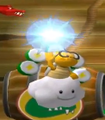Thunder Lakitu: Difference between revisions
LinkTheLefty (talk | contribs) |
mNo edit summary |
||
| Line 9: | Line 9: | ||
A '''Thunder Lakitu'''<ref>Miller, Kent, and Terry Munson. ''Super Mario World 2: Yoshi's Island'' Player's Guide. [[media:SMW2 Guide 128.jpg|Page 128]].</ref> is a [[Lakitu]] that shoots out a ball of energy, setting the ground on fire. This fire moves out in a disappearing wave shape. They make their first appearance in ''[[Super Mario World 2: Yoshi's Island]]'' in the [[level]], [[BLIZZARD!!!]]. These pink Lakitus make a loud noise and the screen flashes when they attack, so the player can detect when they are about to attack. Thunder Lakitus reappear in ''[[Yoshi's New Island]]'', where they are only found in the level [[Bandit Valley]]. | A '''Thunder Lakitu'''<ref>Miller, Kent, and Terry Munson. ''Super Mario World 2: Yoshi's Island'' Player's Guide. [[media:SMW2 Guide 128.jpg|Page 128]].</ref> is a [[Lakitu]] that shoots out a ball of energy, setting the ground on fire. This fire moves out in a disappearing wave shape. They make their first appearance in ''[[Super Mario World 2: Yoshi's Island]]'' in the [[level]], [[BLIZZARD!!!]]. These pink Lakitus make a loud noise and the screen flashes when they attack, so the player can detect when they are about to attack. Thunder Lakitus reappear in ''[[Yoshi's New Island]]'', where they are only found in the level [[Bandit Valley]]. | ||
In ''[[Mario Power Tennis]]'', the Thunder Lakitu has a major appearance in the [[DK Jungle Court]]. They are able to clear the field from [[Klaptrap]]s, by burning them with lightning bolts in the gimmick courts mode. Here, their skin is that of a normal Lakitu. | In ''[[Mario Power Tennis]]'', the Thunder Lakitu has a major appearance in the [[DK Jungle Court]]. They are able to clear the field from [[Klaptrap]]s, by burning them with lightning bolts in the gimmick courts mode. Here, their skin and shell is that of a normal Lakitu. | ||
<gallery> | <gallery> | ||
ThunderLakitu MPT.png|''Mario Power Tennis'' | |||
Bandit Valley.png|''Yoshi's New Island'' | Bandit Valley.png|''Yoshi's New Island'' | ||
</gallery> | </gallery> | ||
{{br|left}} | {{br|left}} | ||
Revision as of 01:14, September 1, 2020
- This article is about the enemy in Super Mario World 2: Yoshi's Island. For the boss in New Super Mario Bros., see Lakithunder.
Template:Species-infobox A Thunder Lakitu[1] is a Lakitu that shoots out a ball of energy, setting the ground on fire. This fire moves out in a disappearing wave shape. They make their first appearance in Super Mario World 2: Yoshi's Island in the level, BLIZZARD!!!. These pink Lakitus make a loud noise and the screen flashes when they attack, so the player can detect when they are about to attack. Thunder Lakitus reappear in Yoshi's New Island, where they are only found in the level Bandit Valley.
In Mario Power Tennis, the Thunder Lakitu has a major appearance in the DK Jungle Court. They are able to clear the field from Klaptraps, by burning them with lightning bolts in the gimmick courts mode. Here, their skin and shell is that of a normal Lakitu.
Names in other languages
| Language | Name | Meaning | Notes |
|---|---|---|---|
| Japanese | かみなりジュゲム[2][3] Kaminari Jugemu |
Thunder Lakitu |
Trivia
- Thunder Lakitus may be based on the Japanese thunder god, Raijin who also wears a set of drum-like ornaments on his back, has red skin and can control lightning.
- In Super Mario Bros.: Peach-hime Kyushutsu Dai Sakusen! (which predated the existence of Thunder Lakitus by years), a Lakitu uses several weather-based features from his cloud to wake up his Spiny's eggs. When he uses lightning, his cloud gains a Raijin-like set of drums, giving him a noticeable resemblance to a Thunder Lakitu.
References
| Lakitus | |
|---|---|
| Characters | Flight • King Lakitu • Laki • Lakilester • Lakilulu • Lakithunder • Lakitu • Lakitu Bros. • Royal bus driver • Spike Storm |
| Species | Aqua Lakitu • C. Fishing Boo • Calm Lakitu • Commander Lakitu • Dark Lakitu • Fishing Boo • Fishin' Lakitu • Glam Lakitu • Gold Lakitu • Lakipea • Lakitufo • Lakitu • Lakitu in a Pipe • Lakitu King • Lakitu R • Lakitu trio • Thunder Lakitu • Wall Lakitu |

